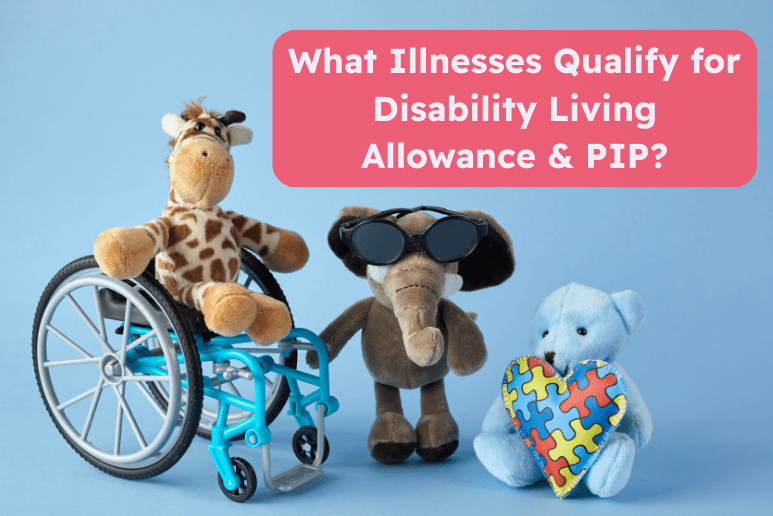All Articles
3 min read
What Illnesses Qualify for Disability Living Allowance & PIP?
Written by
Purpl
Published on
August 20, 2025

When it comes to benefits like Disability Living Allowance (DLA) and Personal Independence Payment (PIP), the rules can feel like a maze. Add in the government’s shifting policies and the endless acronyms, and it’s no wonder so many disabled people feel lost. This guide breaks down exactly what conditions qualify, what support you might be entitled to, and how it all works in practice.
First Things First: What’s the Difference Between DLA and PIP?
- Disability Living Allowance (DLA) is being phased out for most adults and has been replaced by PIP.
- Children under 16 can still apply for DLA.
- Adults 16–64 need to apply for PIP, unless you’re already on DLA and haven’t been switched over yet.
- People over pension age may instead be eligible for Attendance Allowance.
What Qualifies as Disability Living Allowance?
DLA is designed to help with the extra costs of looking after a child with a disability or long-term health condition. It doesn’t matter what the condition is – what matters is how it affects daily life. For example:
- A child who needs more help than another child their age with mobility, personal care, or supervision.
- Conditions might include autism, ADHD, epilepsy, cerebral palsy, learning disabilities, rare genetic disorders, or long-term mental health conditions.
Apply for DLA for children on the gov.uk website.
What Medical Conditions Qualify for Disability in the UK?
There isn’t a fixed “list” of conditions that automatically qualify you for disability benefits. Instead, it comes down to:
- How your condition affects your daily life (washing, dressing, cooking, mobility, communication).
- How long it’s likely to last (usually at least 12 months).
That said, some of the most common conditions people claim PIP for include:
- Autism and ADHD
- Depression and anxiety
- Bipolar disorder and schizophrenia
- Multiple sclerosis (MS)
- Parkinson’s disease
- Arthritis
- Fibromyalgia and chronic pain conditions
- Cancer
- Epilepsy
- Diabetes complications
- Dementia and Alzheimer’s
Full guidance is available at gov.uk PIP conditions and eligibility.
How Much is the Full Disability Living Allowance?
For children under 16, DLA rates (2025) are:
- Care component: £28.70 to £108.55 a week (depending on how much support is needed).
- Mobility component: £28.70 or £75.75 a week (depending on mobility needs).
For adults, PIP has two parts:
- Daily living: £72.65 (standard) or £108.55 (enhanced).
- Mobility: £28.70 (standard) or £75.75 (enhanced).
Payments are made every 4 weeks.
Use the PIP checker tool to see current rates.
What you Need to Know About Applying
- Evidence is everything. Medical notes, letters from specialists, support plans, and even diaries of daily struggles can make a huge difference.
- You don’t have to fit a stereotype of “disabled” to qualify – hidden disabilities count too.
- PIP assessments are based on how you cope with specific activities, not on your diagnosis alone.
- You can appeal if your claim is rejected – and many people win on appeal.
Final Thoughts
Whether you’re a parent applying for DLA for your child, or an adult navigating the world of PIP, remember: benefits aren’t about charity – they’re about rights. The system can feel designed to wear people down, but knowing what you’re entitled to makes the process that little bit easier.
At Purpl, we’ll keep breaking it down so you don’t have to dig through endless government jargon.

Sammi is autistic, has ADHD, and lives with POTS. She’s passionate about disability advocacy, accessibility, and creating spaces where people feel seen, heard, and understood. With a sharp sense of humour and a deep love for community, she speaks openly about the realities of being neurodivergent across all of her personal platforms, always aiming to challenge stigma, spark conversations, and remind others they’re not alone.
Other articles you might like:
DWP Confirms Small Benefits Increase for PIP, Carer’s Allowance & More
Going Abroad On PIP: The 4-Week Rule That Could Pause Your Payments
Changes to Universal Credit: What They Mean for Disabled People, and Where to Get Support
How to Challenge a PIP Decision in the UK: What to Do If Your Claim Is Refused or Underpaid
PIP Reform 101: Latest Update on Personal Independence Payment (PIP) Changes
